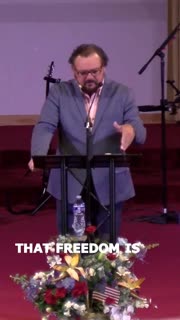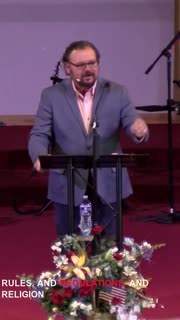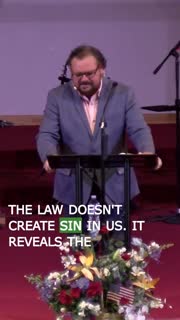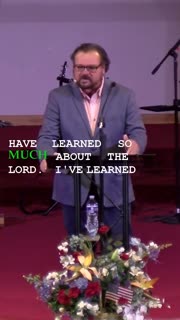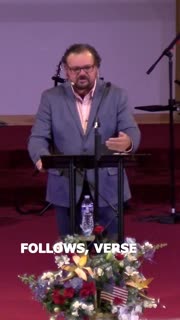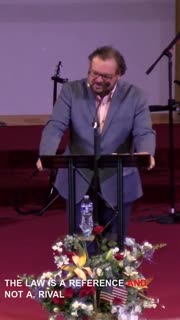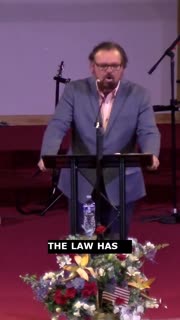True Freedom: Embracing Grace Over Legalism in Christ
Summary
### Summary
Good morning, church family. Today, we gathered to pray for our sister Teresa Velazquez, who is on her way to the hospital. We then delved into Galatians chapter 3, focusing on the theme of true freedom in Christ. Reflecting on the historical significance of the Declaration of Independence, we discussed how our founding fathers sought freedom from tyranny, much like how we seek spiritual freedom through Jesus Christ. The freedom that Jesus offers is far more enduring and profound than any earthly freedom.
We resumed our series on Amazing Grace, exploring how Paul addresses the issue of legalism in the Galatian church. The Judaizers were teaching that salvation required adherence to the law in addition to faith in Jesus. Paul refutes this by emphasizing that the law cannot bring us closer to God; instead, it reveals our sinfulness and our need for a Savior. The law is a curse, not a cure for sin, and it serves as a barrier rather than a bridge to God. It was never intended to justify us but to point us to Christ, who alone can redeem us from the curse of the law.
Paul uses the example of Abraham to illustrate that God's promise of salvation through faith predates the law. The law was given to highlight our transgressions and to guide us until Christ came. Jesus fulfilled the law and took upon Himself the curse of sin, offering us true freedom through His sacrificial death and resurrection. This freedom is not about adhering to rules and regulations but about living by faith in Jesus Christ.
In conclusion, the law serves as a reference, not a rival, to Jesus. It points us to our need for a Savior and highlights the grace that God offers through faith in Christ. We are no longer under the law but under grace, and this grace leads us to live lives that reflect Christ's love and righteousness.
### Key Takeaways
1. The Law as a Curse, Not a Cure: The law reveals our inability to achieve perfection and thus condemns us rather than commends us. It shows that partial obedience is still disobedience in God's eyes, emphasizing our need for a perfect Savior. [38:36]
2. The Law as a Barrier, Not a Bridge: The law cannot justify us before God; it only highlights our sinfulness. True justification comes through faith in Jesus Christ, who bridges the gap between our imperfection and God's holiness. [43:06]
3. The Law as a Reference, Not a Rival: The law points us to Jesus, who fulfilled its demands and took upon Himself the curse of sin. This act of redemption allows us to receive the promised Spirit through faith, highlighting the insufficiency of the law and the sufficiency of Christ. [53:14]
4. The Law as an Advocate for Faith: The law serves as a guardian that leads us to Christ. It shows us our need for a Savior and prepares us to receive the grace that comes through faith in Jesus. This grace frees us from the bondage of sin and the curse of the law. [57:34]
5. Freedom Through Christ: True freedom is found not in religious rituals or self-righteousness but in the redemptive work of Jesus Christ. By laying down the law and embracing the grace offered at the cross, we experience spiritual freedom that no earthly power can take away. [01:04:56]
### YouTube Chapters
[0:00] - Welcome
[27:32] - Prayer for Teresa Velazquez
[27:59] - Introduction to Galatians 3
[28:34] - Historical Context of Freedom
[30:01] - Patrick Henry's Declaration
[31:34] - True Freedom in Christ
[33:01] - Resuming the Amazing Grace Series
[34:31] - Reading Galatians 3:10-29
[38:36] - The Law as a Curse, Not a Cure
[43:06] - The Law as a Barrier, Not a Bridge
[45:58] - The Purpose of the Law
[50:38] - The Law and Consequences
[54:43] - Redemption Through Christ
[57:34] - The Law as an Advocate for Faith
[01:04:56] - Freedom Through Christ
[01:06:21] - Invitation and Closing Prayer
Study Guide
### Bible Reading
- Galatians 3:10-29
- John 8:36
- Deuteronomy 27:26
### Observation Questions
1. According to Galatians 3:10, what happens to those who rely on the works of the law? [34:31]
2. How does Paul describe the law in relation to faith in Galatians 3:12? [34:31]
3. What does John 8:36 say about the freedom that Jesus offers?
4. In Deuteronomy 27:26, what is said about those who do not uphold the words of the law?
### Interpretation Questions
1. Why does Paul refer to the law as a curse in Galatians 3:10? How does this relate to our need for a Savior? [38:36]
2. How does the law act as a barrier rather than a bridge to God, according to the sermon? [43:06]
3. What does it mean that the law is a reference and not a rival to Jesus? How does this understanding affect our view of the law? [53:14]
4. How does the concept of true freedom in Christ, as mentioned in John 8:36, differ from the freedom sought by the founding fathers of America? [31:34]
### Application Questions
1. Reflect on a time when you tried to earn God's favor through your own efforts. How did that experience compare to living by faith in Jesus? [33:01]
2. The sermon mentioned that the law can push us farther away from God if we rely on it for justification. How can you ensure that your faith remains centered on Christ rather than on religious rituals? [33:01]
3. Paul emphasizes that true freedom is found in Christ and not in adhering to the law. How can you embrace this freedom in your daily life, especially in areas where you feel bound by rules or expectations? [57:34]
4. The pastor mentioned that the law serves as a guardian leading us to Christ. How can you use this understanding to explain the purpose of the law to someone who is struggling with legalism? [58:43]
5. Think about the statement, "The law is a reference, not a rival." How can this perspective help you in your personal Bible study and application of God's Word? [53:14]
6. The sermon highlighted the importance of laying down the law and embracing grace. What practical steps can you take this week to live more fully in the grace that Jesus offers? [01:04:56]
7. How can you support someone in your small group or community who is struggling with the burden of legalism, helping them to find true freedom in Christ? [01:06:21]
Devotional
Day 1: The Law as a Curse, Not a Cure
The law reveals our inability to achieve perfection and thus condemns us rather than commends us. It shows that partial obedience is still disobedience in God's eyes, emphasizing our need for a perfect Savior. The law was never meant to be a means of salvation but a mirror reflecting our sinful nature and our need for Jesus. By understanding the law's true purpose, we can better appreciate the grace that God offers through faith in Christ. This grace is not earned by our adherence to the law but is a gift freely given to those who believe.
Galatians 3:10-11 (ESV): "For all who rely on works of the law are under a curse; for it is written, 'Cursed be everyone who does not abide by all things written in the Book of the Law, and do them.' Now it is evident that no one is justified before God by the law, for 'The righteous shall live by faith.'"
Reflection: Think of an area in your life where you have been trying to earn God's favor through your own efforts. How can you shift your focus from self-reliance to faith in Jesus today? [38:36]
Day 2: The Law as a Barrier, Not a Bridge
The law cannot justify us before God; it only highlights our sinfulness. True justification comes through faith in Jesus Christ, who bridges the gap between our imperfection and God's holiness. The law serves to show us how far we fall short of God's standards, making it clear that we need a Savior. Jesus' sacrificial death and resurrection provide the bridge we need to cross from condemnation to salvation. By placing our faith in Him, we are justified and made right with God, something the law could never achieve.
Galatians 3:21-22 (ESV): "Is the law then contrary to the promises of God? Certainly not! For if a law had been given that could give life, then righteousness would indeed be by the law. But the Scripture imprisoned everything under sin, so that the promise by faith in Jesus Christ might be given to those who believe."
Reflection: Identify a specific sin or shortcoming that the law has revealed in your life. How can you bring this to Jesus in faith, trusting Him to bridge the gap between your imperfection and God's holiness? [43:06]
Day 3: The Law as a Reference, Not a Rival
The law points us to Jesus, who fulfilled its demands and took upon Himself the curse of sin. This act of redemption allows us to receive the promised Spirit through faith, highlighting the insufficiency of the law and the sufficiency of Christ. The law serves as a reference, showing us our need for a Savior and guiding us to the grace found in Jesus. By fulfilling the law, Jesus made it possible for us to live under grace, not under the burden of the law. This grace empowers us to live lives that reflect Christ's love and righteousness.
Galatians 3:24-25 (ESV): "So then, the law was our guardian until Christ came, in order that we might be justified by faith. But now that faith has come, we are no longer under a guardian."
Reflection: How has the law served as a reference point in your spiritual journey? In what ways can you more fully embrace the grace that Jesus offers, moving beyond the law's limitations? [53:14]
Day 4: The Law as an Advocate for Faith
The law serves as a guardian that leads us to Christ. It shows us our need for a Savior and prepares us to receive the grace that comes through faith in Jesus. This grace frees us from the bondage of sin and the curse of the law. The law's role is to advocate for faith by making us aware of our shortcomings and pointing us to the solution found in Jesus. By understanding this, we can appreciate the law's purpose and embrace the freedom that comes from living by faith in Christ.
Galatians 3:23-24 (ESV): "Now before faith came, we were held captive under the law, imprisoned until the coming faith would be revealed. So then, the law was our guardian until Christ came, in order that we might be justified by faith."
Reflection: Reflect on a time when the law made you aware of your need for a Savior. How did this experience lead you to a deeper faith in Jesus? How can you continue to let the law guide you to Christ today? [57:34]
Day 5: Freedom Through Christ
True freedom is found not in religious rituals or self-righteousness but in the redemptive work of Jesus Christ. By laying down the law and embracing the grace offered at the cross, we experience spiritual freedom that no earthly power can take away. This freedom allows us to live lives that reflect Christ's love and righteousness, unburdened by the constraints of the law. In Christ, we are free to serve God and others out of love, not obligation, and to live in the fullness of the Spirit.
Galatians 5:1 (ESV): "For freedom Christ has set us free; stand firm therefore, and do not submit again to a yoke of slavery."
Reflection: In what areas of your life are you still living under the constraints of the law rather than the freedom of grace? How can you embrace the freedom that Christ offers and live more fully in His love and righteousness today? [01:04:56]
Quotes
### Quotes for Outreach
1. "Ultimately, that freedom is tenuous and it's very fragile. That freedom is not guaranteed. The freedom that comes from Jesus Christ is as rock solid as the Savior himself. When we come to Jesus and we get that spiritual freedom, we get that spiritual freedom. From sin, sorrow, and death, we are truly and completely free. Jesus said in John chapter 8, verse 36, so if the Son sets you free, you will be free indeed. That, friends, is the greatest freedom ever purchased for any of us." [31:34] (38 seconds)
2. "Rules, and regulations, and religion cannot lead you into a relationship with Christ. It cannot lead you into a relationship with God. It can actually do just the opposite. It can actually push you farther away from God. And so Paul, who is a former Jew himself, wrote this book basically telling these Judaizers, if you want to experience true freedom in Jesus, you've got to lay down the law. You've got to lose your religion." [33:01] (28 seconds)
3. "The law is a curse and not a cure for sin. So Paul is dealing with people who love to quote the Old Testament, so he decides to fight fire with fire. He quotes the Old Testament, specifically Deuteronomy 27, 26, and he shows that the law is actually a curse itself. The law does not commend people who try to keep it. It actually condemns people because they can't keep it." [38:36] (23 seconds)
4. "The law was not given to us to show us how good we can be. It was given to show us how sinful we simply are. The law eliminates, or I should say it illuminates our faults. It does not eliminate our faults. It's a mirror by which we see our sin." [50:38] (17 seconds)
5. "The law doesn't create sin in us. It reveals the sin in us because we are spiritual failures. We are all in big trouble and that's why we all need Jesus Christ. From one end of the Bible, the primary message is the lawmaker became the law keeper and he died for me, the law breaker. And when you understand that, you're going to lay down the law and you'll find spiritual freedom at the cross of Jesus Christ." [01:04:56] (26 seconds)
### Quotes for Members
1. "I've learned so much about the Lord. I've learned so much about myself, about salvation, about how legalism creeps into our lives, even if we're on the lookout for it. Sometimes it's still there, and our traditions, and the way we were raised. Well, that's just what I've always heard. Those kind of things can lead to legalism, and that's what Paul is fighting in this letter and at this church." [31:34] (27 seconds)
2. "The law is a barrier and not a bridge to God. So if what Paul says is true, then his next conclusion naturally follows, verse 11. Now it is evident that no one is justified before God by the law, for the righteous shall live by faith, but the law is not of faith, rather the one who does them shall live by faith." [43:06] (-459 seconds)
3. "The law is a reference and not a rival with Jesus. It's a reference for, I should say. So, the law is perfect, and we're not. Only a perfect person could ever have a relationship with a perfect God, and the only way that we can ever be perfect is to achieve perfection. We cannot do that because we're under a curse. So now, the same law refers to the one who is perfect. He can remove the curse, and that is Jesus." [53:14] (22 seconds)
4. "The law is an advocate for and not an addition to faith. Now, Paul comes to this climactic statement when he reminds us that the law wants us to achieve Jesus wants us to, us to receive. Verse 23. Now, before faith came, we were held captive under the law, imprisoned until the coming faith would be revealed. So then, the law was our guardian until Christ came, in order that we might be justified by faith." [57:34] (-1230 seconds)
5. "The law has always pointed to grace, not to our goodness. It's always pointed to faith, not in fulfillment. And that's why there's always going to be only two choices that you're going to make when it comes to having a relationship with God. Your goodness or God's grace, your religion or his redemption. You're either going to try to do all that you can for God or you're going to be trusting in all that God has done for you." [01:03:31] (24 seconds)
